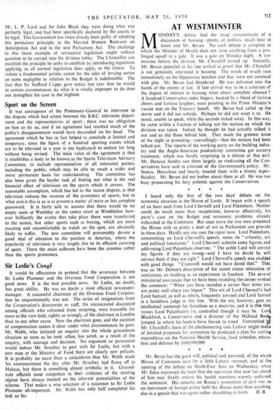Sport on the Screen
It was courageous of the Postmaster-General to intervene in the dispute which had arisen between the B.B.C. television depart- ment and the representatives of sport ; there was no obligation on him to do so, and if no agreement had resulted much of the public's disappointment would have descended on his head. The agreement which he has in fact helped to conclude is limited and temporary, since the figure of a hundred sporting events which are to be televised in a year is too haphazard to endure for long without being revised. The main value of the agreement is that it establishes a body to be known as the Sports Television Advisory Committee, to include representatives of all interested parties, including the public, which may be able to reach a wider and more permanent basis for understanding The committee has also been given the harder task of finding out what is the real financial effect of television on the sports which it covers. The reasonable assumption, which has led to the recent dispute, is that television reduces the revenue of the promoters of sports, but to what extem this is so is at present a matter of more or less complete guesswork. It is fairly safe to assume that there would be no empty seats at Wembley or the centre court at Wimbledon how- ever brilliantly the events that take place there were transferred to the screen, but other sports such as boxing, which are more exacting and uncomfortable to watch on the spot, are obviously likely to suffer. The new committee will presumably devote a good deal of attention to the position in America, where the popularity of television is very largely due to its efficient covering of sport. There the main sufferers have been the cinemas rather than the sports promoters.






































 Previous page
Previous page